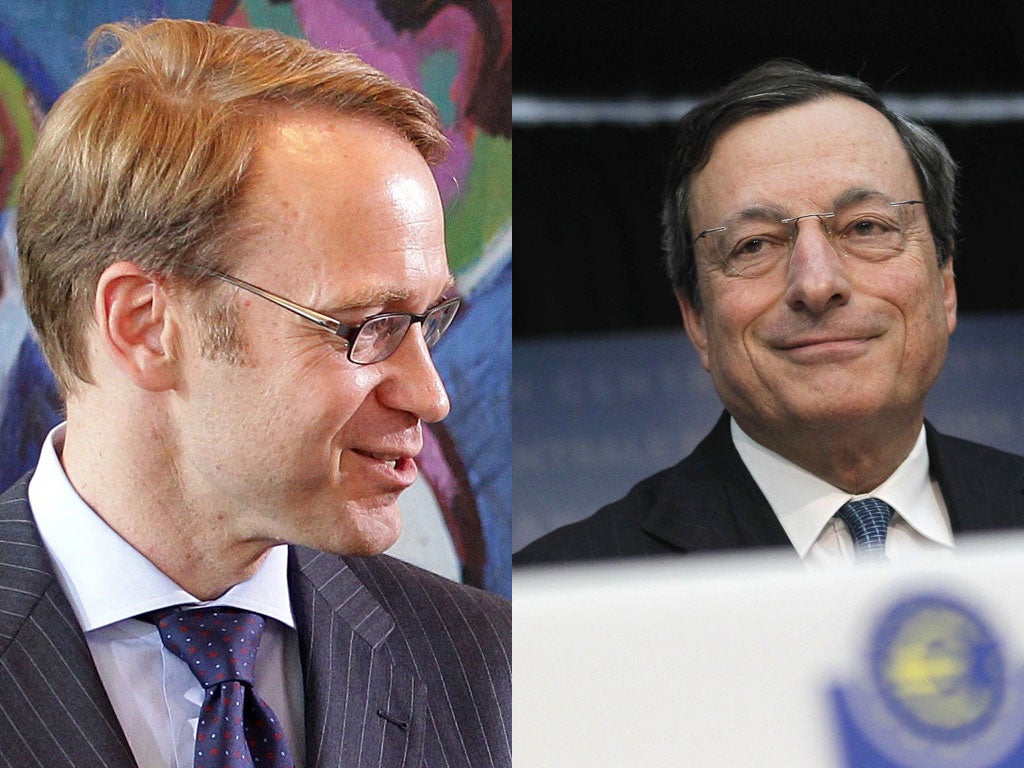Share prices crash as Mario Draghi's 'big bazooka' falls flat
Italy and Spain take a fresh hammering after European Central Bank fails to promise action

Your support helps us to tell the story
From reproductive rights to climate change to Big Tech, The Independent is on the ground when the story is developing. Whether it's investigating the financials of Elon Musk's pro-Trump PAC or producing our latest documentary, 'The A Word', which shines a light on the American women fighting for reproductive rights, we know how important it is to parse out the facts from the messaging.
At such a critical moment in US history, we need reporters on the ground. Your donation allows us to keep sending journalists to speak to both sides of the story.
The Independent is trusted by Americans across the entire political spectrum. And unlike many other quality news outlets, we choose not to lock Americans out of our reporting and analysis with paywalls. We believe quality journalism should be available to everyone, paid for by those who can afford it.
Your support makes all the difference.Troubled Spain and Italy took a fresh hammering and shares plunged across the world yesterday as the European Central Bank dashed hopes of a "big bazooka" to tackle the region's debt woes.
With the eyes of the world's financial markets fixed on Frankfurt, the ECB president, Mario Draghi – who promised boldly last week to do "whatever it takes" to preserve the euro – failed to offer up any new measures or "shock and awe" tactics to address the single currency bloc's lingering crisis.
Mr Draghi's recent comments in London had inspired a week-long rally, with investors expecting at the very least a firm commitment to ease the pressure on Spain and Italy by buying up their debt to soothe bond markets.
But under pressure from a German Bundesbank opposed to such a move, he would only say the ECB "may" act, holding out no definite promises of action. Mr Draghi also offered no relief on interest rates, which were left unchanged.
"The ECB did not deliver the big bazooka some market participants had hoped for. It only gave some hints at intentions and possible plans for the future. Today was a cold shower for those expectations," ING Bank economist Carsten Brzeski said.
The let-down from Europe came a day after the US Federal Reserve hinted that it could embark on a third round of money-printing this autumn, to counteract a weak jobs market and a slowing economy. Former Bank of England rate-setter David Blanchflower added: "The three lessons of the 1930s depression is that monetary policy is powerful, you should act sooner rather than later and do more rather than less. Draghi has failed on all three counts."
The disappointment sent immediate shockwaves through global markets. Spain's borrowing costs were sent soaring back through the 7 per cent danger mark which previously heralded bailouts for Greece, Ireland and Portugal. Italy also endured an alarming rise in its funding costs. Spain's stock market sank more than 5 per cent while London's leading shares swung into the red with a 0.7 per cent decline.
Investors had hoped the ECB would use the firepower of the region's existing bailout pot, the European Financial Stability Facility, to intervene in debt markets following June's political summit. But Mr Draghi emphasised that it was up to nations like Spain to formally request a full-scale bailout for the EFSF to be used, which would be tied to harsh fiscal conditions. He also ruled out granting a banking licence to the EFSF's successor, the €500bn European Stability Mechanism, which has yet to come into legal force. This had also been mooted as a "big bazooka" because the ESM would then be able to draw on the unlimited resources of the ECB to prop up debt markets.
Mr Draghi acknowledged scepticism from Bundesbank chief Jens Weidmann over bond buying by the central bank as the ECB is forbidden by treaty from using its monetary powers simply to finance government debts. Any action would need a further decision of the ECB's governing council before it could be launched.
Berlin also believes that over-zealous ECB support would remove pressure on heavily indebted countries to reform their economies and become more competitive.
"Monetary policy cannot be a substitute for nations' own efforts in financial and economic policy and for this reason it can offer no sustainable resolution of the crisis," said Germany's Economy Minister, Philipp Roesler. Spain's Prime Minister, Mariano Rajoy, and the Italian leader, Mario Monti, called in a joint statement at the last EU summit for measures to be put in place as soon as possible to ease the pressure on the debt-laden duo.
Collision course: Battle of the bankers
Mario Draghi
Who is he? President of the European Central Bank, Italian but got the job because he was the most 'German' candidate.
What does he want? To preserve stable prices in the Eurozone and defend the "irreversible" single currency itself – within the limits allowed by the Bundesbank. Wants Europe to push ahead with the necessary budget cuts and institutional reforms needed bring the single currency bloc closer together and prevent another crisis.
Jens Weidmann
Who is he? President of the Bundesbank, Germany's central bank, and former economics adviser to Chancellor Angela Merkel.
What does he want? To keep the ECB on a firm leash and put a brake on anything that involves German taxpayers effectively handing over billions more to the Eurozone's spendthrift strugglers. Is opposed to the ECB buying sovereign bonds, as it breaches the central bank's mandate on not financing the debts of Eurozone nations.
Join our commenting forum
Join thought-provoking conversations, follow other Independent readers and see their replies
Comments